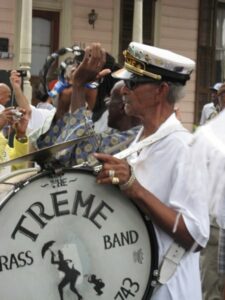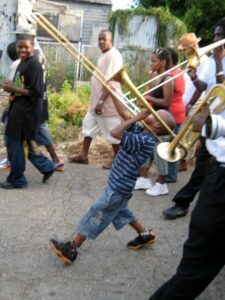Welcome to part 3 of Larry Blumenfeld’s article from Blu Note magazine. In parts 1 and 2 he discussed the rocky balance between music and politics, at least at a municipal bylaw ordinance level. Here is what Larry had to say.
During a press conference at this year’s [New Orleans ]Jazz & Heritage Festival, shortly after the city council passed on adopting a revised noise ordinance, I asked Mayor Landrieu about these issues. He said that he was encouraged about the discussions to date, and that he hoped a reconstituted council would achieve proper legislation. As for the curfew? “It has to go,” he said, “because it focuses on a narrow set of people, and not on a level of noise.”
At this year’s jazzfest press conference Mayor Landrieu told me, “There is a way to organize culture without killing it.” However one feels about attempts to “organize culture” in principle, that’s the job of coherent policymaking.
Or rather, let me reframe the challenge in a more positive light: There is a way to support and nurture culture through intelligent, thought-through policies. (Logically, respect and support for the city’s indigenous jazz culture should go hand-in-hand with a sound investment in cultural economy: In the most crass analysis, if you’re building a market for brass bands, Mardi Gras Indians and traditional jazz, you’re not going to want to cut off the supply.)
In the discussions around these issues there are many voices, including those of the members of organizations such as Vieux Carre Property Owners, Residents and Associates (VCPORA) and French Quarter Citizens, who have been vocal and forceful in promoting their points of view, which are usually at odds with, say, the Music and Culture Coalition of New Orleans (MACCNO) agenda. These ought to be heard and absorbed, and reconciled with the needs and desires of musicians and others with a vested interest in culture.
Back in January, at a rally outside City Hall to raise awareness about a noise ordinance proposal, two representatives of MACCNO, Hannah Kreiger-Benson and Sue Mobley, issued a statement that included this passage:
“Throughout MaCCNO’s work, we have seen the issues around regulation framed in the press and in our opposition’s statements, as a conflict: Musicians versus residents. That framing works on the assumption that ‘resident’ equals ‘upstanding citizen’, and ‘musician’ equals ‘rabble-rouser who disturbs the quality of life’. And it raises the really fundamental question of who gets to judge what is ‘good’ and ‘bad’ in our shared urban landscape. We live here. We work here. We vote here. We are the residents….
In New Orleans, music and culture need a seat at the table. And the city council is just going to have to find a bigger table.
Nine years past disaster, decades (if not a century or two) into an ongoing and deepening disharmony between New Orleans and its indigenous jazz culture, comes a moment when the issues that can deepen or lessen these tensions are laid out on that table.
Is it big and sturdy enough to withstand the hammering out of a policy with enough sensitivity and coherence to honor both the premise and promise of New Orleans culture?







